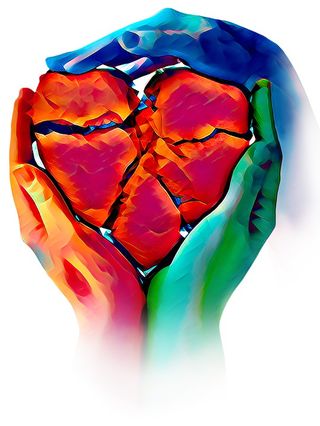Is heartbreak a physical condition?
 Everyone experiences heartbreak at least once in their life and for most, it hurts a lot. It doesn’t always have to be romantically, it can be a from a friendship, from losing hope in life or losing yourself. But more importantly, it always hurts. Almost as if there is a physical pain. It also takes a different amount of time to heal for every individual. But why does it hurt so much? Is it a physical condition and why does your stomach drop, and you experience all these distressing symptoms of loss of appetite, depression, and sadness?
Everyone experiences heartbreak at least once in their life and for most, it hurts a lot. It doesn’t always have to be romantically, it can be a from a friendship, from losing hope in life or losing yourself. But more importantly, it always hurts. Almost as if there is a physical pain. It also takes a different amount of time to heal for every individual. But why does it hurt so much? Is it a physical condition and why does your stomach drop, and you experience all these distressing symptoms of loss of appetite, depression, and sadness?
The brain registers emotional distress of heartbreak in the same way as it registers physical pain. It releases hormones like dopamine and oxytocin that make us want to repeat behaviours, hence the attachment we feel to people. When the ‘happy’ hormones decrease and you no longer are seeing and spending time with the people you love, you become more stressed and therefore more adrenalines enters your system. This raises your cortisol hormone levels. The stress hormone cortisol, adrenaline and noradrenaline cause the physical symptoms that lead us to feeling pain. This pain is presented as anxiety, nausea, and depression, chest pain and panic attacks to name a few.
In a study with participants who had been recently dumped, their magnetic resonance imaging (MRI) scans showed that the areas of the brain that are usually linked to physical pain were activated. As confirmed by Dr Eric Ryan, a clinical phycologist and therapist, ‘heartbreak does involve a some of the same mechanisms as physical pain’.
The heart and the brain begin to get confused as both the sympathetic (responsible for the fight or flight response) and the parasympathetic nervous system (responsible for body at rest) are activated by the heartbreak hormones. These mixed signal causes a disturbance to the heart rate and people with a lower heart rate sometimes have symptoms of fatigue, depression, and insomnia. The heart rate variability is also used to assess the clinical state of depressed patients.
How can you fix a broken heart?
It is hard to let go of memories and the past but you must first start to rebuild yourself. Your self-esteem and confidence. A therapist may be able to help you master your emotions, to develop healthy boundaries and to create new standards for your life but it starts with you and the work you put into yourself. Lastly, our most valuable asset is time.
Written by Maryam Fazalzadeha



